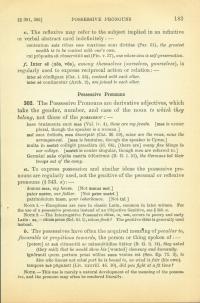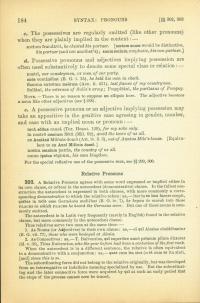302. The possessive pronouns are derivative adjectives, which take the gender, number, and case of the noun to which they belong, not those of the possessor.
Haec ōrnāmenta sunt mea. (Val. 4.4)
These are my jewels.
[mea is neuter plural, though the speaker is a woman.]
Meī sunt ōrdinēs, mea dīscrīptiō. (Cat. M. 59)
Mine are the rows, mine the arrangement.
[mea is feminine, though the speaker is Cyrus.]
multa in nostrō collēgiō praeclāra (id. 64)
[There are] many fine things in our college
[nostrō is neuter singular, though men are referred to.]
Germānī suās cōpiās castrīs ēdūxērunt. (B. G. 1.51)
The Germans led their troops out of the camp.
a. To express possession and similar ideas the possessive pronouns are regularly used, not the genitive of the personal or reflexive pronouns (§ 343.a).
domus mea my house
[Not domus meī]
pater noster our father
[Not pater nostrī]
patrimōnium tuum your inheritance
[Not tuī]
Note 1— Exceptions are rare in classic Latin, common in later writers. For the use of a possessive pronoun instead of an Objective Genitive, see § 348.a.
Note 2— The Interrogative Possessive cûius, -a, -um, occurs in poetry and early Latin.
cûium pecus (Ecl. 3.1)
whose flock?
The genitive cûius is generally used instead.
b. The possessives have often the acquired meaning of peculiar to, favorable or propitious towards, the person or thing spoken of.
[petere] ut suā clēmentiā ac mānsuētūdine ūtātur (B. G. 2.14)
they asked (they said) that he would show his [accustomed] clemency and humanity.
Īgnōrantī quem portum petat nūllus suus ventus est. (Sen. Ep. 71.3)
To him who knows not what port he is bound to, no wind is fair (his own).
Tempore tuō pūgnāstī?
Did you fight at a fit time?
Note— This use is merely a natural development of the meaning of the possessive, and the pronoun may often be rendered literally.
c. The possessives are regularly omitted (like other pronouns) when they are plainly implied in the context.
Socium fraudāvit.
He cheated his partner.
[socium suum would be distinctive, his partner (and not another's); suum socium would be emphatic, his own partner.]
d. Possessive pronouns and adjectives implying possession are often used substantively to denote some special class or relation.
nostrī
our countrymen, or men of our party
Suōs continēbat. (B. G. 1.15)
He held his men in check.
flamma extrēma meōrum (Aen. 2.431)
last flames of my countrymen
Sullānī
the veterans of Sulla's army
Pompêiānī
the partisans of Pompey
Note— There is no reason to suppose an ellipsis here. The adjective becomes a noun like other adjectives (see § 288).
e. A possessive pronoun or an adjective implying possession may take an appositive in the genitive case agreeing in gender, number, and case with an implied noun or pronoun.
meā sōlīus causā (Ter. Heaut. 129)
for my sake only
in nostrō omnium flētū (Mil. 92)
amid the tears of us all
ex Anniānā Milōnis domō (Att. 4.3.3)
out of Annius Milo's house.
[Equivalent to ex Annī Milōnis domō]
nostra omnium patria
the country of us all
suum ipsīus rēgnum
his own kingdom
For the special reflexive use of the possessive suus, see §§ 299, 300.


